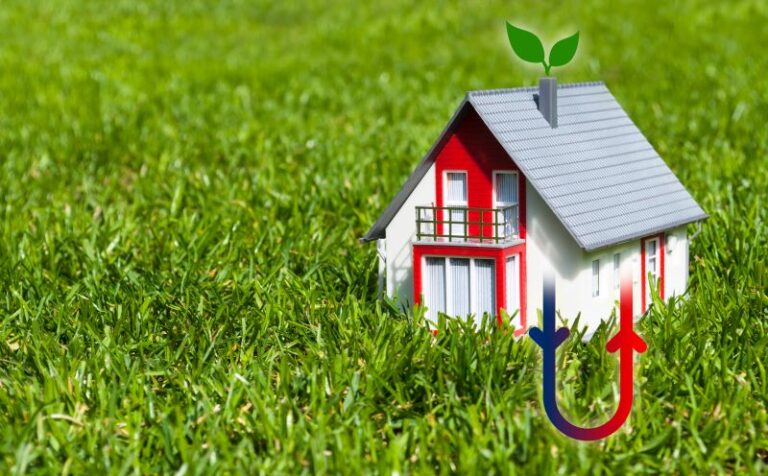There’s an abundant world of energy beneath our feet and not just if we’re in a place with fossil fuel deposits. The thermal mass of the Earth catches energy from the sun and heat radiating outward from the Earth’s core and stores it so well that, just six feet below the surface, the ground temperature is steady at about 50 degrees year-round. From acting as a heat sink in the hot summer months to providing additional home heating in the cooler winters, using the stored energy of the earth, known as geothermal energy, is an appealing prospect to many.
How Geothermal Heating and Cooling Works
A geothermal heat pump consists of a heat exchanger and a long, buried ground loop through which water or refrigerant flows. As the fluid passes through the loop, its temperature stabilizes to the ground temperature, so that the fluid entering the heat exchanger is always around 50 degrees. There, the exchanger can either remove heat energy from the fluid (dropping its temperature) or move indoor heat energy into the fluid (raising its temperature), and send it back underground to equalize again. The cooled or warmed air is then circulated through your home.
Switching to Geothermal
If you’re considering making the switch for your heating and cooling, here are nine things to think about:
- You’ll get extremely high efficiency. While a heat pump installation will require some electricity to run, because you’ll be moving heat energy from place to place (from your home into the earth during the cooling season, and vice-versa in the heating season) you’ll get more heat energy per dollar than you would if you had to generate the heat with a furnace or boiler. In fact, you’ll get three to five times the amount of heat out than you put in as energy.
- There’s a significant upfront outlay. Laying the ground loops for a geothermal system entails an upfront expense and a significant degree of landscape work which may be disruptive as it’s happening. Once complete, though, the geothermal system will pay for itself long before the end of its operating lifetime, and the surface of your yard can be re-landscaped.
- The kind of ground loop you get depends on the kind of land you have. Properties with little horizontal space may want to opt for a vertical ground loop to make sure that the circulating fluid is in contact with the ground long enough for its temperature to equalize. And properties with certain hydrologic features – lakeside properties, for example, with lakes meeting certain requirements – can use the bodies of water as heat sinks.
- Heat pumps are quiet. There’s no surface equipment outside to produce environmental noise, and the indoor noise is largely limited to the circulating air.
- Systems have extremely long operating life spans. The heat pump itself has a life span of several decades, and when it needs to be replaced, the ground loops should still be operating well. Because the installation of the ground loops is the most expensive part of the system, even replacing the heat pump doesn’t represent the full cost of an initial installation.
- Heat pumps handle your heating and air conditioning. In humid subtropical Tampa, you may be more interested in a heat pump’s ability to remove heat from your home than introduce it. A geothermal system handles both needs.
- Heat pumps can be configured to heat multiple locations. If you have an outdoor pool you want heated, you can design your geothermal system to provide for it.
- Most geothermal systems are soil-safe, even should underground damage occur. While some few systems use refrigerant in their ground loops, the most common heat-transfer medium is water. To be certain, speak to your HVAC contractor.
- Homeowners can often receive incentives to switch to high efficiency heat pump systems. Check with your contractor about local, state and federal incentives, including tax credits, grants and rebates. With green energy so high in the public consciousness, there may be help available if you want to make the switch!
If you’d like to learn more about how a geothermal heat pump could fit in your Tampa home, contact us at Senica Air Conditioning, Inc., Inc.
Image Provided by Shutterstock.com

